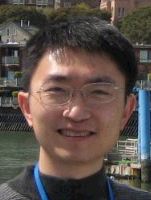- Search NCIBI Data
(e.g. diabetes, csf1r) - Login

 Xiaosong Wang, PH.D.
Xiaosong Wang, PH.D.
Postdoc Research Fellow
Phone: 734-615-4409
E-Mail: xiaosong@med.umich.edu
Short Bio: Xiaosong Wang is a postdoc research fellow at the National Center for Integrative Biomedical informatics. Xiaosong received his Ph. D. at Peking University, where he was trained for molecular biology, bioinformatics, immunology and urology. Before that, he served as a general surgeon and later Urologist in China for four years. Xiaosong’s predoctoral research had a strong focus in the translation of computational and laboratory findings into clinical applications. He developed a public cancer targets database, and then experimentally identified and evaluated two novel urine biomarkers, UCA1 and UPK3A for bladder cancer, resulting in publications in Nucleic Acids Research, Clinical Cancer Research and Urology.
Since joining the University of Michigan, he was under the guidance of Dr. Arul Chinnaiyan and Dr. Gilbert Omenn for integrative biomedical informatics and experimental cancer biology. His current research interests involve the examination of fundamental principles for the identification of driver gene fusions in cancer. He developed a concept signature (ConSig) technology and discovered a fusion breakpoint principle, the combination of which prioritized a recurrent NFE2 fusion in lung adenocarcinoma from paired-end sequencing data, leading to his publication in Nature Biotechnology. He was also selected to give oral presentations at 2009 and 2010 AMIA summit on translational bioinformatics, NCIBI annual research meetings, and poster presentations in 16th Annual International Conference on Intelligent Systems for Molecular Biology, American Association for Cancer Research 100 and 101th Annual Meetings.
Research Interests (Optional): The advancements of high-throughput transcriptomic, genomic and deep sequencing technologies have generated a flood of data in the public domain and private warehouse. However, the laboratory discoveries in the area of cancer research based on the analysis of these data have met with limited success. My research interests are to apply a multiple disciplinary approach inclusive of mathematics and statistics, computer science, bioinformatics, genomics, molecular and cell biology, and clinical tests to discover driver genetic aberrations and qualify robust cancer targets on the basis of these high-throughput measurements.

 NCIBI on Facebook
NCIBI on Facebook NCIBI RSS Feed
NCIBI RSS Feed

